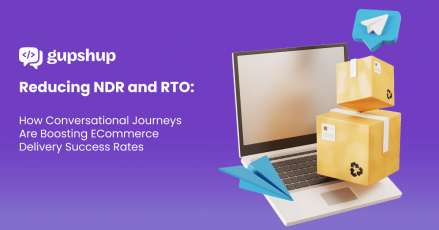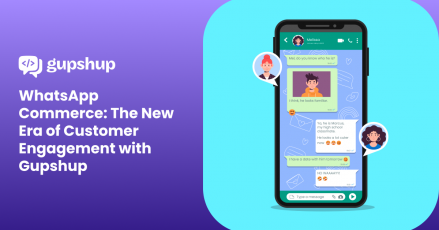Closing More Deals on Amazon: The Power of Conversational AI for South African Brands

Amazon’s recent launch in South Africa isn’t just about expanding its reach — it’s a digital revolution waiting to unfold with the power of conversational AI!
As per Fintechnews, South Africa’s e-commerce revenues are already hitting USD 4.15 billion in 2021 and are projected to nearly double by 2027. Amazon’s arrival opens doors to unprecedented growth opportunities.
For South African brands, this isn’t just about gaining global access; it’s about using Amazon’s cutting-edge technology and logistics, along with tools like a WhatsApp chatbot for business, to streamline operations and maximize efficiency.
We’ve seen similar transformative impacts in other countries, where countless small and medium-sized enterprises thrive on Amazon, driving half of the platform’s sales. If this trend holds in South Africa, local brands stand poised for substantial growth and market prominence.
From personalized shopping experiences to secure payment options, Amazon sets the gold standard in online retail. Coupled with WhatsApp business API benefits, businesses can now engage customers in real time, offering seamless support from initial inquiries to post-purchase satisfaction.
In the article, you will discover how South African brands can leverage Amazon’s advanced technology and expansive reach to enhance customer engagement and thrive.

Why Brands Need to Integrate Conversational AI in Their Marketing Strategy?

Conversational AI, using tools like virtual assistants and WhatsApp chatbot for business, facilitates real-time, personalized customer interactions. This is a critical advantage for South African brands striving to secure more deals on Amazon.
These technologies elevate customer engagement and enhance service delivery, ultimately driving higher sales conversions. Here’s how integrating Conversational AI into your marketing strategy will help businesses –
Creates a Seamless Customer Experience
Conversational AI tools like WhatsApp business API for ecommerce are instrumental in crafting a seamless customer journey across diverse channels. Businesses that excel in omnichannel engagement retain a remarkable portion of their customer base, highlighting the importance of integrating these tools to increase satisfaction and loyalty.
Simplifying Integration
Integrating tools such as the WhatsApp chatbot for business is both straightforward and efficient. It enables rapid deployment, automates responses, and seamlessly integrates with CRM systems.
This agility empowers businesses to adapt to market shifts swiftly and consistently meet evolving customer expectations.
Driving Cost Efficiency
Conversational AI excels in automating routine tasks, delivering significant cost savings. A WhatsApp Business API for ecommerce efficiently manages multiple inquiries simultaneously, slashing labor costs and amplifying operational productivity.
Businesses can achieve comprehensive cost-effectiveness by optimizing operations through the WhatsApp Business API while elevating customer satisfaction levels.
How Can Brands Use Conversational AI to Close Deals on Amazon?

As South African brands navigate the expanding e-commerce landscape, integrating conversational AI into marketing strategies becomes paramount for driving increased sales on Amazon. Here’s how these technologies can be effectively utilized:
-
Use Click-to-WhatsApp Ads for Instant Engagement
Challenge: Many brands struggle to capture and convert leads from social media platforms.
Solution: Implement Click-to-WhatsApp Ads (CTWA) on platforms such as Facebook and Instagram to seamlessly guide customers directly to Amazon.
Implementation Steps:
- Personalized Engagement: Start conversations instantly with personalized greetings via WhatsApp chatbot for business upon clicking the ad. This approach eliminates the need for users to save phone numbers, thereby enhancing engagement rates.
- Real-Time Customer Support: Use the WhatsApp Business API for e-commerce to enable chatbots to provide immediate responses to product inquiries. This direct interaction significantly reduces the sales cycle and boosts conversion rates by 45-60% compared to traditional marketing methods.
- Exclusive Promotions: Offer special discounts or free delivery codes through the chat interface to incentivize purchases. Personalized offers via WhatsApp chatbot for business create urgency and encourage prompt action.
Here is an example to showcase the above:

Implementing QR Codes for Instant Access to Amazon Listings
Challenge: Ensuring a seamless transition for offline customers to online Amazon stores.
Solution: Embed QR codes in marketing materials to seamlessly bridge the offline-to-online shopping experience.
Implementation Steps:
- Confirming Product Interest and Providing Detailed Information: QR codes can be strategically placed on physical marketing materials such as brochures, posters, product packaging, and in-store displays. When customers scan these QR codes with their smartphones, they are immediately directed to the corresponding Amazon listing.
- Sharing FAQs, User Manuals, and Product Tutorials: To further enhance the shopping experience and reduce any hesitation customers might have, QR codes can link to additional resources that aid in the decision-making process. These resources can include:
- FAQs: Address common customer queries, helping them find answers quickly without having to search through multiple pages.
- User Manuals: Provide access to digital versions of product manuals, ensuring customers understand how to use the product correctly and effectively.
Product Tutorials: Offer video tutorials or step-by-step guides that demonstrate product features and usage, helping customers visualize how the product fits their needs.

Developing Voice-Activated Shopping Prompts
Challenge: Traditional online methods may not effectively reach local customers.
Solution: Develop voice-activated shopping prompts tailored for the South African market to highlight local products and brands available on Amazon.
Implementation Steps:
- Integration with Voice Assistants: Integrate AI chatbots with voice assistants like Google Assistant to deliver quick responses to FAQs and provide seamless customer support. This integration is essential for tailoring the experience to the South African market, as it enhances user experience through hands-free interaction. By addressing common questions and support issues quickly, brands can improve customer satisfaction and retention, which is crucial for local products and brands on Amazon.
- Enable Voice Commands for Support: Enable voice commands such as “Hey Google, ask [Brand] about my order” to offer real-time updates and support. Voice commands simplify customer interactions and improve accessibility to information without navigating multiple screens. For South African customers, this feature can make interacting with local brands more convenient and efficient, encouraging more purchases on Amazon.
- Collect Feedback via Voice Interactions to Improve Services: Collecting customer feedback through voice interactions provides valuable insights into customer preferences and pain points. Gathering detailed, real-time feedback that brands can use to refine their products and services is essential. This feedback is crucial for local brands looking to understand and cater to the specific needs of South African consumers, enhancing their presence on Amazon.
- Offer Voice-Guided Tutorials and Demos for Product Use: Voice-guided tutorials and demos help customers better understand how to use products, reducing the likelihood of returns and increasing satisfaction. By offering these tutorials, local South African brands can increase the perceived value of their products on Amazon, encouraging more confident purchases.
Implementing Conversational AR Experiences
Challenge: Customers hesitate to purchase products without trying them first.
Solution: Integrate AR features with conversational AI tools like WhatsApp Business API for ecommerce to allow customers to visualize products in their environment and receive immediate assistance.
Implementation Steps:
- Enhanced Product Visualization: Within the Amazon app, integrate AR capabilities that allow users to preview products like furniture or decor in their living space. Combining AR with conversational AI empowers customers to make confident purchase decisions.
Say John wants to see how the product he was browsing would look in his personal space. So, here is how the interaction between him and the WhatsApp chatbot for business would be –

Integrating conversational AI alongside WhatsApp Business API benefits into marketing strategies is essential for South African brands aiming to boost sales on Amazon. These technologies provide an omnichannel experience, simplify integration, reduce costs, and ultimately enhance customer satisfaction, driving higher sales conversions.
Conclusion
In embracing Amazon’s arrival in South Africa, local brands have a unique opportunity to harness cutting-edge technologies like conversational AI and the WhatsApp Business API. These tools not only streamline operations and drive efficiencies but also pave the way for personalized customer interactions that elevate the shopping experience.
As e-commerce continues to evolve, integrating these technologies into marketing strategies becomes advantageous and essential for capturing market share and fostering long-term customer loyalty.
Ready to elevate your brand’s customer engagement with conversational AI and WhatsApp Business API? Explore Gupshup’s solution today and discover how you can enhance your presence on Amazon and beyond.
FAQ
Q1. Can South Africans make money on Amazon?
Yes, South Africans can make money on Amazon by selling products through Amazon’s marketplace, becoming affiliates, or using Amazon Kindle Direct Publishing. This allows local entrepreneurs to reach a global audience and capitalize on Amazon’s extensive logistics and customer base.
Q2. Is Amazon trading in South Africa?
Yes, Amazon is trading in South Africa. The company has expanded its operations and is actively engaging in the South African market, offering a range of services, including Amazon Web Services (AWS) and its e-commerce platform.
Q3. Does Amazon function in South Africa?
Yes, Amazon functions in South Africa, providing access to its global marketplace. South African customers can purchase products, and local sellers can list their products on Amazon, benefiting from its extensive infrastructure and customer reach.




